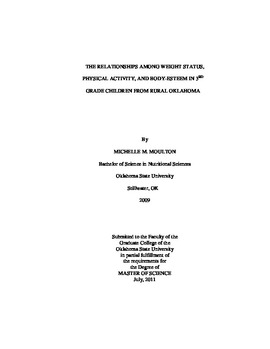| dc.contributor.advisor | Shriver, Lenka H. | |
| dc.contributor.author | Moulton, Michelle Marie | |
| dc.date.accessioned | 2014-04-15T22:01:23Z | |
| dc.date.available | 2014-04-15T22:01:23Z | |
| dc.date.issued | 2011-07-01 | |
| dc.identifier.uri | https://hdl.handle.net/11244/9252 | |
| dc.description.abstract | Currently, 37% of children ages 6 to 11 years are either overweight or obese in the U.S. Overweight children have an increased risk for chronic diseases and lower self-esteem than normal weight children. Some studies indicate that rural residents are more likely to be obese than their urban counterparts. While some studies have examined child obesity rates in rural areas, a critical gap still exists in our understanding of the relationship between body weight, physical activity, and body-esteem. Thus, the main purpose of this study was to examine the associations among weight status, physical activity, and body-esteem in a sample of 3rd grade children from rural Oklahoma. This exploratory study used secondary data that were collected from 241 children participating in a school-based physical activity and fitness assessment in Spring of 2008. The assessment was conducted in 12 rural Oklahoma schools as part of a large project called the Families and Schools for Health (FiSH) that was funded by the United States Department of Agriculture (USDA). Anthropometrics (height, weight, and BMI-for-age) were measured for each child. The Self-Administered Physical Activity Checklist (Sallis et al., 1996) was used to determine children's activity levels. Body-esteem was measured using the 20-item Body-Esteem Scale for Children by Mendelson and White (1982). Statistical analyses included descriptive statistics, bivariate correlations, one-way ANOVA, and factorial ANOVA. The level of significance was p<0.05. Physical activity was not significantly correlated with children's body-esteem. Overweight and obese children had significantly lower BES scores compared to normal weight children. There were no significant differences in normal-weight children on BES-Global and BES-subscale scores in boys or girls. Gender and weight status had a significant interaction effect on body-esteem. Both overweight and obese girls had significantly lower BES than normal-weight girls, while only obese boys had a significantly lower BES than normal-weight boys. | |
| dc.format | application/pdf | |
| dc.language | en_US | |
| dc.publisher | Oklahoma State University | |
| dc.rights | Copyright is held by the author who has granted the Oklahoma State University Library the non-exclusive right to share this material in its institutional repository. Contact Digital Library Services at lib-dls@okstate.edu or 405-744-9161 for the permission policy on the use, reproduction or distribution of this material. | |
| dc.title | Relationships Among Weight Status, Physical Activity, and Body Esteem in 3rd Grade Children from Rural Oklahoma | |
| dc.type | text | |
| dc.contributor.committeeMember | Harrist, Amanda | |
| dc.contributor.committeeMember | Hildebrand, Deana A. | |
| osu.filename | Moulton_okstate_0664M_11368.pdf | |
| osu.college | Human Environmental Sciences | |
| osu.accesstype | Open Access | |
| dc.description.department | Department of Nutritional Sciences | |
| dc.type.genre | Thesis | |
| dc.subject.keywords | body-esteem | |
| dc.subject.keywords | childhood obesity | |
| dc.subject.keywords | elementary | |
| dc.subject.keywords | gender differences | |
| dc.subject.keywords | physical activity | |
| dc.subject.keywords | rural | |
